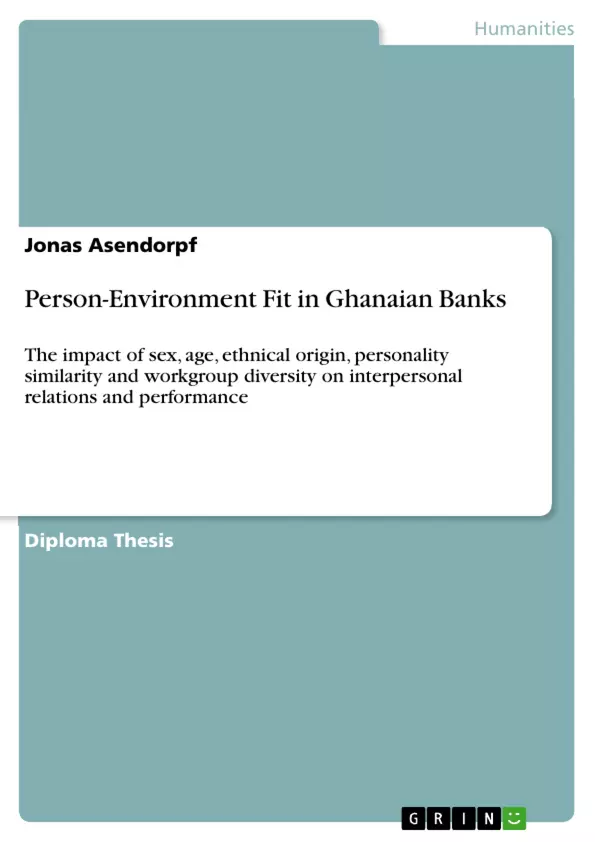The African nations are not only economically underdeveloped, but also received little attention by psychological research, which is extensively reviewed and critizised. Few substantial research covers interpersonal relationships’ dependence on attribute configurations of dyads or workgroups, and their associations with outcomes. These relations were analyzed within a person-environment fit framework, covering the three facets Person-Supervisor Fit, Person-Workgroup Fit, and workgroup diversity in sex, age, ethnical origin and personality in a sample of three banks in Ghana using multi-level analysis. Findings indicate a highly differentiated pattern of fit effects on the outcomes leader-member exchange, relationship style with and positive affect towards the leader, perceived workgroup cohesion, follower’s affective commitment, promotion, income and group performance. They could mostly not be explained with common similarity attraction or information/decision-making paradigms but rather unique historical and societal dynamics, indicating that fit effects are highly sensitive to context factors.
Inhaltsverzeichnis (Table of Contents)
- 1 Theory
- 1.1 The context: Ghana in Africa
- 1.1.1 A critique of the 'Africa' construct
- 1.1.2 Ghana - historical, demographic and empirical descriptions
- 1.2 Person-environment fit
- 1.2.1 Attribute domains
- 1.2.2 Relational demography
- 1.2.3 Diversity
- 1.2.4 Theoretical background
- 1.2.5 The case of age
- 1.2.6 The case of personality
- 1.2.7 Context as a moderator
- 1.2.8 Tenure as a moderator
- 1.3 Individual and group level outcomes
- 1.3.1 Performance figures
- 1.3.2 Leader-Member Exchange
- 1.3.3 Attitudes
- 1.4 Constructivism
- 1.5 Concluding hypotheses
- 2 Method
- 2.1 Study one
- 2.1.1 Participants
- 2.1.2 Introduction
- 2.1.3 Data-assessment with repertory-grid technique
- 2.1.4 Structuring the constructs
- 2.1.5 Item generation
- 2.2 Study two
- 2.2.1 Participants
- 2.2.2 Used instruments and their psychometric qualities
- 2.2.3 Development of the Leader-Follower Relationship Scale (LFR)
Zielsetzung und Themenschwerpunkte (Objectives and Key Themes)
This thesis analyzes interpersonal relationships in Ghanaian banks within a person-environment fit framework. The study investigates how factors such as sex, age, ethnicity, personality similarity, and workgroup diversity impact interpersonal relations and performance. The research aims to understand the complex interplay of these factors and their influence on various outcomes, moving beyond simple similarity attraction models.
- Person-environment fit in the context of Ghanaian banks
- The impact of demographic and personality variables on interpersonal relations
- The influence of workgroup diversity on performance outcomes
- Examination of leader-member exchange and relationship styles
- The role of context and societal factors in shaping fit effects
Zusammenfassung der Kapitel (Chapter Summaries)
Chapter 1: Theory This chapter establishes the theoretical foundation for the study, providing context on Ghana and critiquing generalizations about Africa. It then delves into the person-environment fit framework, exploring attribute domains, relational demography, diversity, and the theoretical background. Specific attention is given to the roles of age and personality, along with the moderating effects of context and tenure. Finally, it outlines individual and group-level outcomes like performance, leader-member exchange, and attitudes.
Chapter 2: Method This chapter details the methodology employed in two studies. Study one describes participants, data assessment using repertory grid techniques, and construct structuring. Study two outlines its participants, instruments used, and the development of the Leader-Follower Relationship Scale (LFR).
Schlüsselwörter (Keywords)
Person-environment fit, Ghana, relational demography, workgroup diversity, leader-member exchange, interpersonal relations, performance, personality, age, ethnicity, context, organizational behavior.
- Citation du texte
- Dipl. Psych Jonas Asendorpf (Auteur), 2008, Person-Environment Fit in Ghanaian Banks, Munich, GRIN Verlag, https://www.grin.com/document/120209



